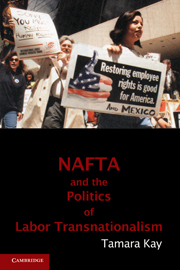Book contents
- Frontmatter
- Contents
- List of Tables
- List of Figures
- Preface
- Acknowledgments
- List of Abbreviations
- 1 Introduction
- PART ONE THE EMERGENCE OF TRANSNATIONALISM
- PART TWO VARIATIONS IN TRANSNATIONALISM
- 6 Missing the Opportunity NAFTA Provided
- 7 Explaining Variation in the Emergence of Labor Transnationalism
- PART THREE CONCLUSIONS
- Appendix
- Bibliography
- Index
7 - Explaining Variation in the Emergence of Labor Transnationalism
Published online by Cambridge University Press: 05 June 2012
- Frontmatter
- Contents
- List of Tables
- List of Figures
- Preface
- Acknowledgments
- List of Abbreviations
- 1 Introduction
- PART ONE THE EMERGENCE OF TRANSNATIONALISM
- PART TWO VARIATIONS IN TRANSNATIONALISM
- 6 Missing the Opportunity NAFTA Provided
- 7 Explaining Variation in the Emergence of Labor Transnationalism
- PART THREE CONCLUSIONS
- Appendix
- Bibliography
- Index
Summary
All North American unions were exposed to NAFTA as a potential catalyst for labor transnationalism. Only certain unions, however, developed transnational relationships in NAFTA's wake. The degree to which unions embraced labor transnationalism varied significantly. Although the majority recognized some common interests with their counterparts across the continent, not all unions adopted strategies that furthered mutual interests through concrete action. The trade agreement's power to catalyze transnational labor relationships, though significant, was therefore not absolute. It is clear from the data in previous chapters that economic factors alone – including the perception of NAFTA as a threat – do not adequately explain the emergence of labor transnationalism. Explaining variation in NAFTA's effect therefore requires examining the politics rather than simply the economics of globalization.
Four industrial and institutional variables emerged from interview data as the most crucial to the emergence of and variation in labor transnationalism: (1) a progressive U.S. union; (2) a progressive Canadian union; (3) a progressive Mexican union; and (4) industry vulnerability to foreign trade (defined as industries vulnerable to job movement and/or foreign competition, including factory or work relocation, work reorganization, and import competition). Although there is no scholarly consensus on whether unions vulnerable to foreign trade are more or less likely to cooperate transnationally (see Bhagwati 2000), data from previous chapters suggest that many of the largest U.S. and Canadian industrial unions in the most vulnerable industries responded to NAFTA's threat by joining transnational coalitions and seeking out potential partners in Mexico.
- Type
- Chapter
- Information
- NAFTA and the Politics of Labor Transnationalism , pp. 230 - 252Publisher: Cambridge University PressPrint publication year: 2011



